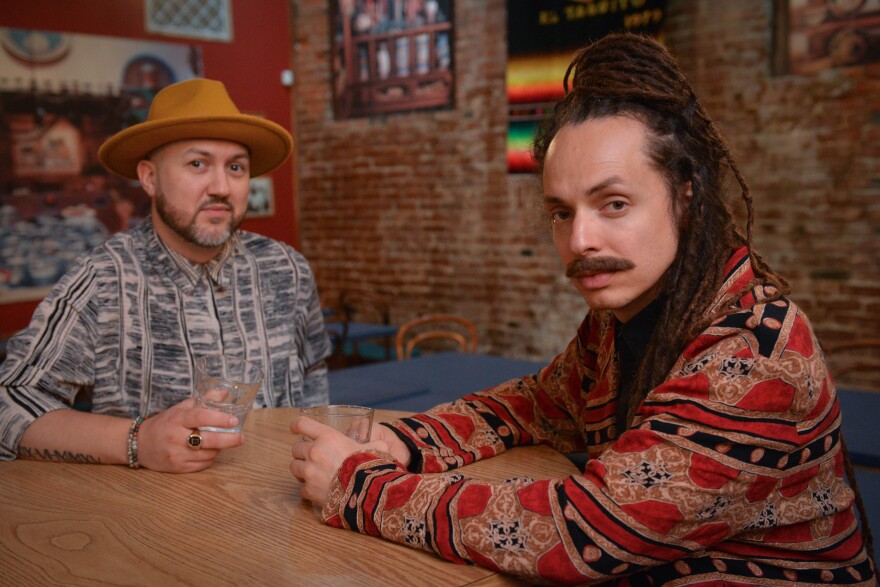For more stories like this one, subscribe to Real Humans on Apple Podcasts or Spotify.
Making Movies is as big a success story as you'll find in Kansas City's music scene.
The high-energy, genre-defying rock band, with songs in both Spanish and English, has been nominated for a Latin Grammy. They've shared stages with indie darlings like Arcade Fire and big-name acts like Los Lobos. Their music has been written up in Rolling Stone and the band performed for NPR's Tiny Desk Concert series.
Point being, the local aspect of Making Movies is strictly a matter of location. This band belongs not to Kansas City, but to America.
And yet the music industry doesn't always know what to do with them — often resulting in insulting stage assignments at big festivals.
"There are gatekeepers and there's awards and there's this whole industry and infrastructure," explains Enrique Chi, who plays guitar and sings lead vocals. "By singing in Spanish, we're generally instantly earmarked as 'does not fit.' Or, 'If we can invite you, we're checking off a box. So we're going to put you in the diversity tent.'"
That tent isn't a metaphor.
"We've played a festival where we were like, 'Where are we playing today?' We see all these big stages. We see all these people out and about, and then we look at this little tent and it's like, 'Oh, we're playing there. Weird. Why are we playing there?' — this little tiny tent that fits about 25 people," Chi explains. "And I walked out to the front of it and it said on the front, it said, 'culture tent.'"
After accumulating a handful of experiences like that, Making Movies started questioning why people didn't consider their music "Americana." What's more American than a band with musicians whose life stories span the hemisphere?
Chi was born in Panama; he moved to Lee's Summit when he was six. His bandmate, Juan-Carlos Chaurand, was born and raised in Kansas City by Mexican immigrants with French heritage.
If Making Movies isn't Americana, what is? And who else has been left out?
The band has been exploring those questions with an ongoing project called "AMERI'KANA," which began as an album in 2019. When the pandemic hit, they had just started planning a big festival by the same name.
The headlining concert was packed with acts whose music, like their own, had been excluded from "Americana" — not just the genre, but the entire category of cultural artifacts deemed quintessentially American.
"We're saying, this is what Americana should look like, especially today," Chi says.
Because of the pandemic, though, the event had to be scrapped. "So we were like, well, what could we do that would be different?" Chi recalls.
Inspiration hit while the band was in Memphis to record an album. Just like themselves, big-time musicians near and far were floundering without gigs to play.
"We realized, well, wait a second. Memphis has like all this history and these folks are kind of available. We started calling around and they're all like, 'Yeah, I'm available,'" Chi says, still giddy at the memory of it.
The result is an upcoming Kansas City PBS documentary bringing viewers all over the country with Chi and Chaurand for jam sessions with people like Cedric Burnside, keeper of the Mississippi Hill Country blues tradition, and grandson of the legendary R.L. Burnside; soul singer Deborah Barnes (who used to perform with Ray Charles as a Raylette) and her two sons, Chris and Courtney, the Sensational Barnes Brothers; and New Orleans musician Terrence Simien, who took up and then transformed Zydeco late in life.
Every jam session turns into a conversation.
"I knew I was going to hear about how race affected things. And I knew that I was going to hear a bit of frustration about the injustice of it all," Chi says.
A poignant moment comes from Boo Mitchell, a musician in his own right as well as the owner of Royal Studios in Memphis. It's the same place where his even-more-famous father, Willie Mitchell, produced and engineered songs by Al Green, Ann Peebles, Buddy Guy and the like.
The elder Mitchell started working at Royal Studios as an employee. In the documentary, Boo Mitchell recalls how on Willie's first day, a coworker — who was a Klansman — told Willie not to touch the engineering equipment; that it wasn't for Black people.
The day Willie Mitchell bought Royal Studios, his son explains, his first decision was to fire that guy on the spot.
But Chi also heard something he didn't expect: "Maybe the most beautiful thing about it was that I was expecting to dig up this animosity, and I generally found joy."

In another incredible scene, Deborah Barnes looks back on being a pre-teen in Memphis during the Civil Rights Movement, playing music to mobilize and unify the big crowds at Martin Luther King, Jr.'s speeches and marches. Beyond the pain felt by the protesters, and the assassination of the leader who inspired her, what stood out to Barnes was the pure fun of making music with others who shared her vision of justice.
Chi's travels showed him that what his band represents — this constant, eclectic blending of influences and sounds — doesn't exist outside the story of Americana. Rather, it is the story of Americana.
No matter where bands like Making Movies are slated to perform, audiences and musicians already know what the industry won't yet accept: This tent is big enough for all of it.
"If you're in a culture like this, this country being such an experiment — experiment of democracy, experiment of cross-pollination of cultures — we're living the experiment," Chi says. "We don't know exactly how the experiment ends up."







